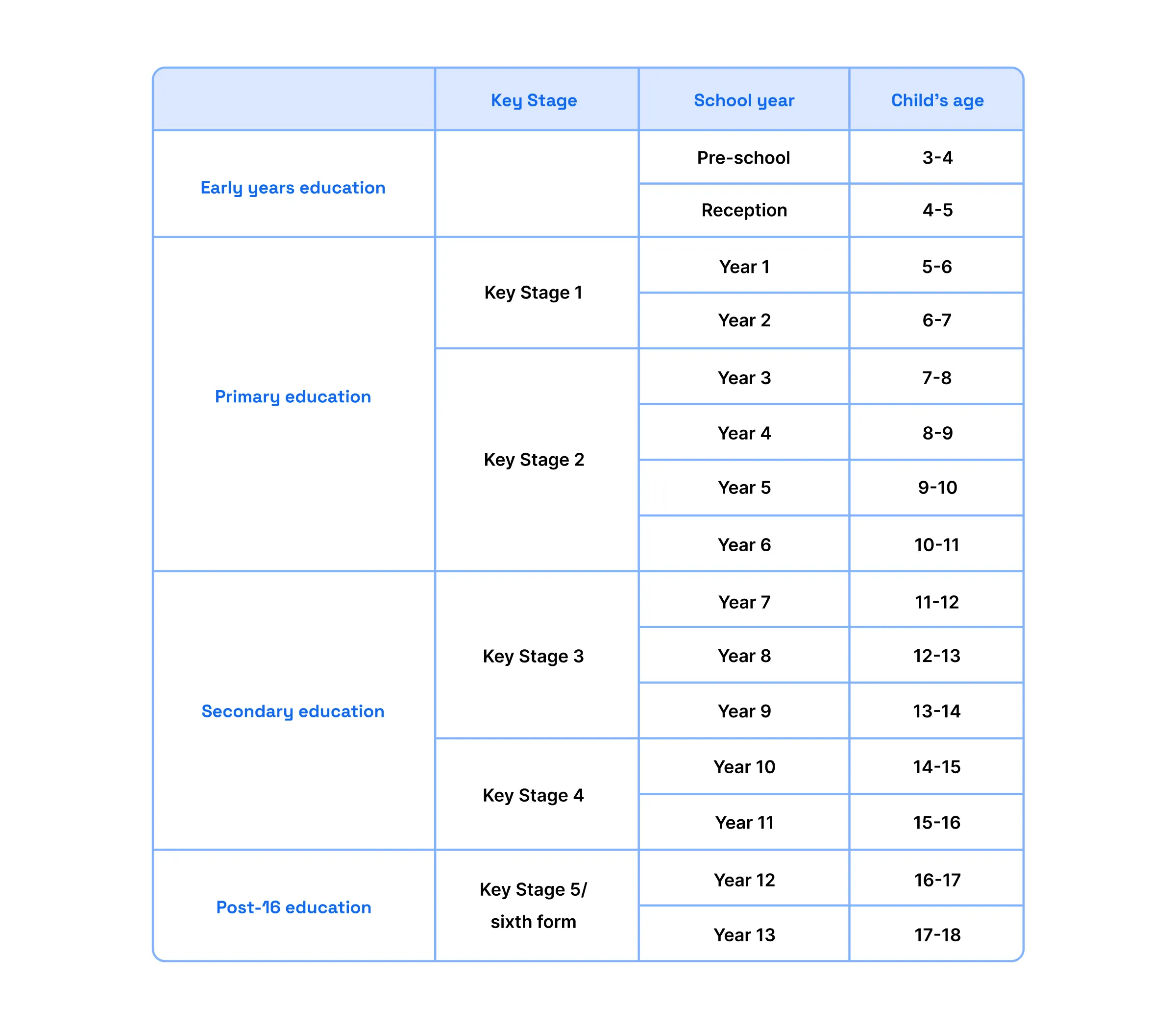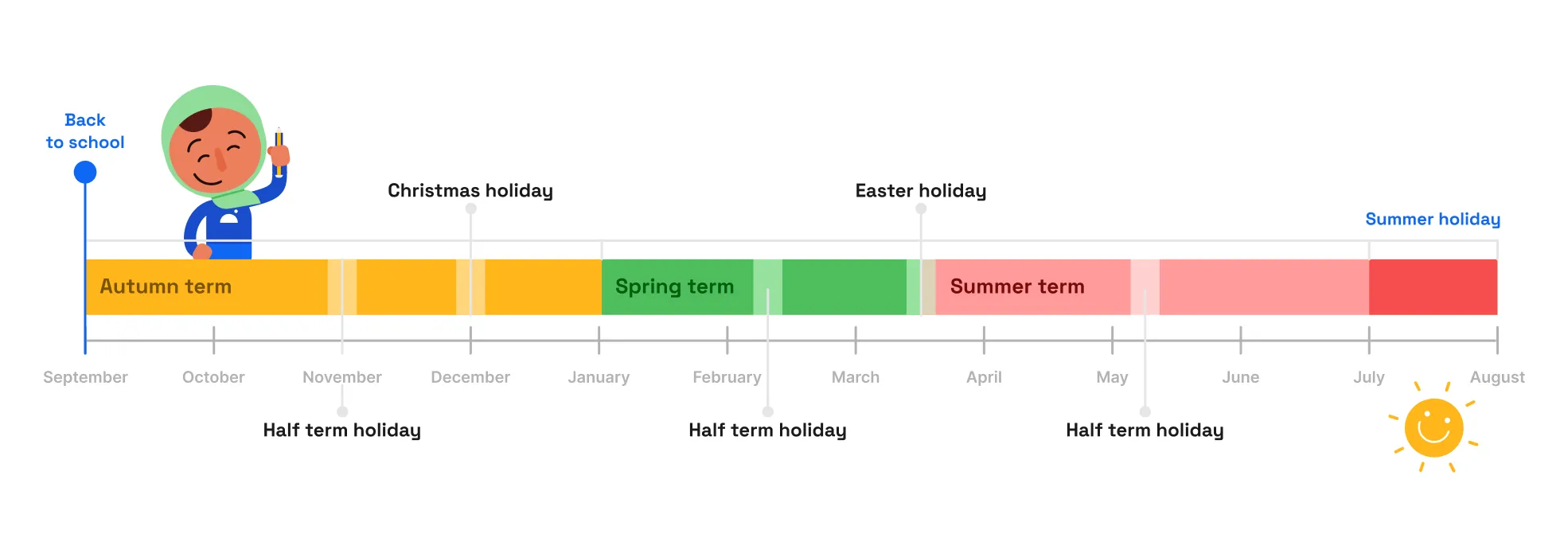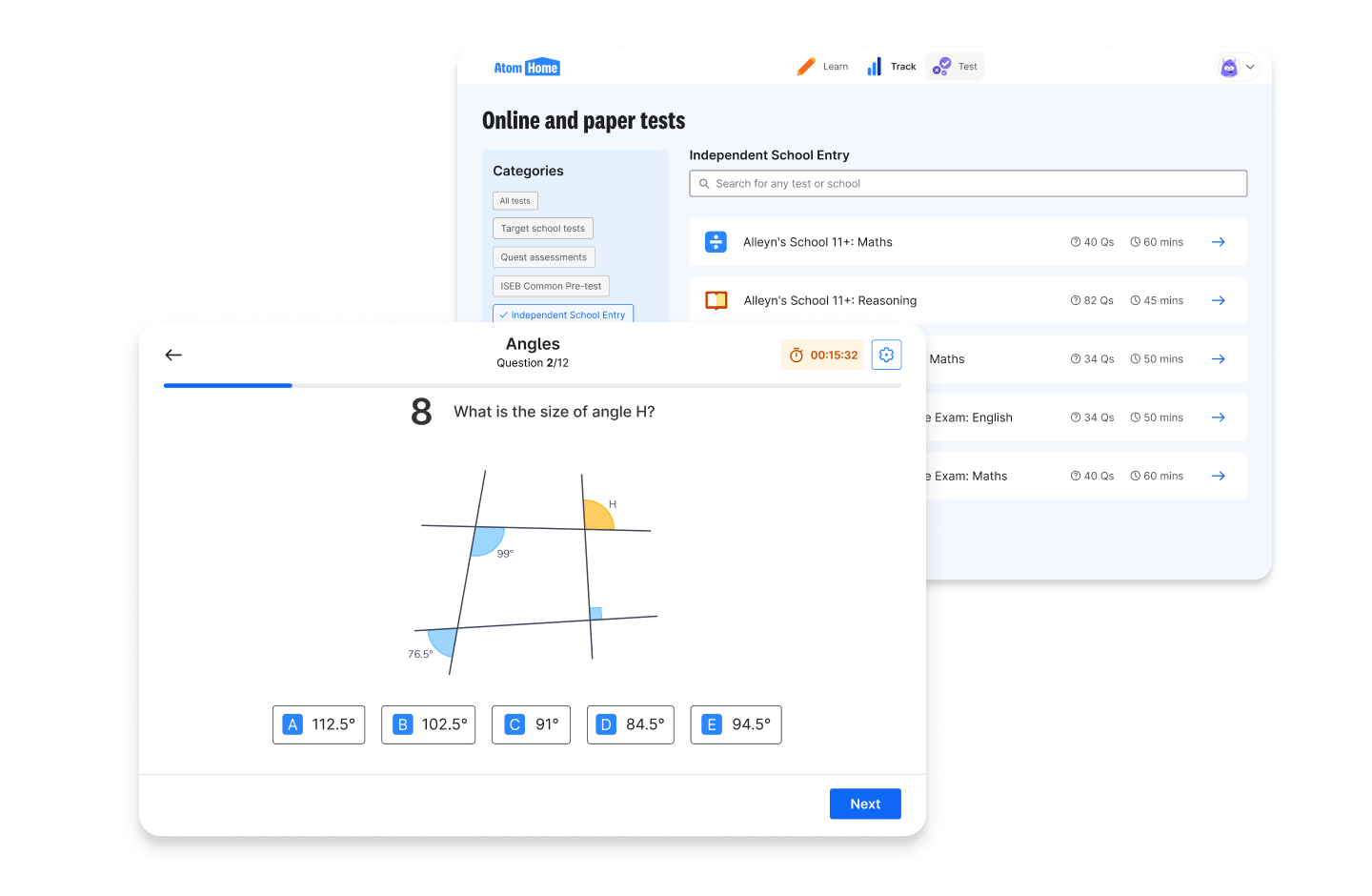Guide to the UK school system

Are you considering moving to the United Kingdom for your child’s education? Or perhaps you are thinking about sending your child overseas to attend a UK boarding school? This guide covers everything you need to know about the British school system and how to choose a school for your child.
This is part one of our guide to moving to the UK for school. The second part of the guide covers how to apply and prepare for entrance exams.
The Key Stages
The UK school system is divided into stages:
- Early years education: ages 3–5.
- Primary education: ages 5–11. Split into Key Stage 1 (ages 5–7) and Key Stage 2 (age 7–11)
- Secondary education: ages 11–16. Split into Key Stage 3 (ages 11–14) and Key Stage 4 (ages 14–16)
- Post-16 education: ages 16–18.

Education is compulsory in the UK for children between 5 and 16 years old. There are some variations in the school system between England, Scotland, Wales and Northern Ireland, but they follow the same basic structure.
Types of UK schools
State schools vs. private schools
- State schools are any type of school that is funded by the state, either by the government or a local authority or trust. They tend to have larger class sizes of up to 30 pupils. All UK children between ages 5–16 are entitled to a free place at a state school near where they live. Children can’t attend a state school outside their local area.
- Private schools, also known as independent schools, charge fees to parents instead of being funded by the government. They often have smaller class sizes and a reputation for high quality teaching and facilities. The fees vary depending on the region and your child’s age. An average fee is £6,000 per term, or £18,000 per year. (See the top ten private schools in England here.)
- Public schools – confusingly, a historical term for a type of private school.
Selective vs. non-selective
- Selective schools are any school that accepts pupils based on academic performance. There are entrance exams and sometimes interviews which children must pass to get a place. Selective schools can be state or private. Selective state schools are known as grammar schools.
- Non-selective schools do not take into account academic ability when deciding whether to admit pupils. There is no entrance exam or interview. They may use other criteria though, such as where a pupil lives (‘catchment’). Most state schools and many private schools are non-selective.
- Some schools are semi-selective, meaning that they set entrance exams but with a lower pass mark, or only a certain percentage of their places are assessed on academic ability.
Boarding schools
At boarding schools, children stay on site and are provided with meals and accommodation. Many boarding schools are private schools with elite status. They charge fees for both education and boarding, at an average of £30,000 per year per child. (Explore the UK's top boarding schools.)
Boarding schools are a popular choice for international pupils. Full boarding is for pupils who only return to their families at the end of term, while flexi boarding is for pupils who stay for one or two nights a week, and weekly boarding is for pupils who go home at the weekends. Some boarding schools also admit day pupils who go home at the end of the school day.
Private boarding schools in the UK include:
- Bedales School (mixed)
- Benenden School (girls)
- d'Overbroeck's (mixed)
- Sutton Valence School (mixed)
- Tonbridge School (boys)
There are a few state boarding schools in the UK. These schools provide free education and charge fees only for boarding, at around £15,000 a year. They may be selective grammar schools or non-selective academies. State boarding schools give priority to children who need to board. Learn more at the BSA State Boarding Forum.
State boarding schools include:
- Colchester Royal Grammar School (boys)
- Cranbrook School (mixed)
- Haberdashers’ Adams Grammar School (boys)
- Ripon Grammar School (mixed)
Glossary of UK school terms
Primary school
A school offering primary education (ages 4–11). Usually refers to state schools.
Infant school
A school offering Key Stage 1 primary education (ages 4–7).
Junior school
A school offering Key Stage 2 primary education (ages 7–11).
Pre-prep
A private school offering primary education for ages 3–7.
Prep school
(Short for preparatory school) – a private school for ages 7–13.
Secondary school
A school offering secondary education (ages 11–16), more often refers to state schools. Sometimes called high school.
Senior school
Usually refers to private secondary schools. Children start at either 11 or 13 and leave at 16 or 18.
Academies and free schools
A type of state school run by a not-for-profit trust, which is independent of the local authority and has more freedom.
SEN school
A private or state school for children with Special Educational Needs.
Co-educational/mixed school
A school where girls and boys are educated together. Most UK schools are mixed.
Single-sex school
A school that educates either girls or boys only. More common for grammar and independent schools.
Sixth form/college
A school for students aged 16–18 to study for A levels. Sixth forms can be attached to a secondary school, or they can be separate.
£100 off your Atom Home subscription
You have the chance to win £100 off your Atom Home subscription when you sign up to our newsletter.

The national curriculum in England
The national curriculum is used by schools to make sure that children learn the same things. It includes a list of subjects and standards children should reach in each subject at each Key Stage.
All state schools funded by local authorities in England must follow the national curriculum. Academies and free schools have more independence to follow their own curriculum, but it must be broad and balanced and include the same key subjects. Private schools do not have to follow the national curriculum, but they must be registered with the government and inspected regularly.
Primary curriculum (Key Stage 1 & 2)
Compulsory national curriculum subjects at primary school:
- English
- Maths
- Science
- Design and technology
- History
- Geography
- Art and design
- Music
- Physical education (PE), including swimming
- Computing
- Ancient and modern foreign languages (at Key Stage 2)
Primary schools must also provide:
- Relationships and health education
- Religious education (RE) (parents can ask for their child to be taken out of the whole lesson or part of it)
Schools often also teach:
- Personal, social and health education (PSHE)
- Citizenship
- Modern foreign languages (at Key Stage 1)
- Sex education (parents can ask for their child to be taken out of the lesson)
Online learning for Key Stage 2
Atom is a fun and convenient way for your child to get up-to-date with the Key Stage 2 national curriculum, to give them a smooth academic transition to UK senior school.
Schools in Northern Ireland, Scotland and Wales use their own curriculum structures which are similar to the one in England.
UK qualification levels
- GCSEs – national exams taken at age 16.
- A levels – national exams taken at age 18, for getting a place at university.
- IB/International Baccalaureate – an equivalent qualification to A levels, more often offered by independent schools than by state schools.
You can learn about and compare the different qualification levels in the UK here.
The UK school year
In Britain, the academic year starts in September and ends in July. It is split into three terms of roughly twelve weeks:
- Autumn term (September–December)
- Spring term (January–March/April)
- Summer term (April–July)
Each term is usually divided into two halves. There is a week’s break in the middle, half-term holidays. Between the terms, there are three major breaks:
- Christmas holidays (December)
- Easter holidays (March or April)
- Summer holidays (July–August)
The exact dates of school terms and holidays vary depending on the school and region. Independent schools tend to have longer holidays than state schools.

A timeline of the UK school year (click for larger version)
The UK school day
Children at state schools attend school from Monday to Friday. At independent schools, children often attend school on Saturday mornings too.
A typical state school day in the UK starts between 8.45am and 9am, and ends between 3pm and 4pm. At independent schools, hours are usually longer, with classroom lessons taking place from 8.30am to 4.30pm followed by activities until 7pm.
Children are usually given a short break mid-morning and mid-afternoon, and a 30–60 minute break for lunch at 12pm or 1pm. Some children attend extracurricular activities such as sports clubs or music lessons during their lunch break.
Breakfast clubs are available to provide childcare before school, typically an hour before school starts. Children have breakfast together then do activities or homework. After-school clubs also offer extracurricular activities at both state and private schools.
During the primary years, it’s common for a class of children to stay in one classroom, where they are taught all subjects by one teacher. At secondary school, children are more likely to have timetabled lessons. They will need to move between classrooms and teachers for different subjects.
How to choose a UK school
When choosing a UK school for your child, there are lots of decisions to make. Every child is unique, and will need different qualities in a school at different stages of their life. The most important consideration is what is right for your family. What kind of environment will your child thrive in at this stage of their development?
Visits and open days
If possible, visit the school or at least attend a virtual open day to get a feel for their ethos. Take every opportunity to learn more about the school community and assess whether it's a good fit for your child.
Some questions you might wish to ask school staff:
- How do you support international children to transition into the school, academically and socially?
- How do you balance student wellbeing with academic excellence?
- What support do you have for students speaking English as a foreign language?
- What is the timetable like? How much downtime do students have?
- What’s your philosophy on homework – how much is there on a nightly basis?
- How do you incorporate digital skills into the curriculum? What’s your approach to online learning if this becomes necessary again?
Choosing a UK school: what to consider
State or private?
State schools are free, but places are not available on most types of visa. Private schools are expensive, but known for their teaching quality and extracurricular opportunities.
Boarding or day school?
Boarding school is a practical option for children whose parents are living overseas. It can foster independence and offer an immersive education. However, it can be a lonely experience for some children and parents.
Single-sex or mixed?
Opinions vary as to which approach has the most educational benefits.
Location
Would you prefer your child to be educated in a rural setting with space for outdoor adventures, or in a city with a wealth of cultural opportunities? If travel is a consideration, is the school near an airport or train station?
Academic profile
Does your child enjoy studying and will they thrive in an environment with a lot of challenge? What are the school’s academic results like? (Take a look at their ISI or Ofsted report, and their results in school league tables.)
Facilities and enrichment
Does your child have a particular talent for music, sports, or arts, and does the school have facilities to support this?
SEN
Does the school have a SENCo (Special Educational Needs Coordinator)? What is their policy for supporting children with SEN?
International profile
Will your child have the opportunity to learn alongside a mix of different nationalities? Do other children from your home country attend the school? Do you want your child to be fully immersed in an English-speaking environment?
In part two of this guide, learn about the UK school application process and how to help your child prepare for entrance assessments.
Take control of your child’s independent school prep.

Worried about keeping pace with the competition? Independent school exams can feel unpredictable, but your child’s preparation doesn’t have to be. Atom shows you exactly what to practise and how they’re performing, so you can stay ahead throughout the admissions process.
- Follow personalised weekly exam plans that show them what to learn next.
- Practise with mock tests that replicate their exam and generate new questions every time, so they build real exam skills.
- Track progress and see how they compare to others preparing for the same schools.
Start your free trial and help your child get ready for senior school entry.
